Previously: From Arthur Conan Doyle to New York City's "Elementary": The Costume Design of Holmes and Watson.
Given the nature of Sherlock Holmes fandom, it's not entirely surprising that people were forming their opinions of Elementary and arguing about it before anyone had even seen the show. Some Holmes canon purists hated the fact that it was set in America; some fans of BBC Sherlock hated the idea of "another remake" so quickly on the heels of the British series. And people from both groups seemed irritated by the concept of a female Watson, prompting the first wave of backlash from pre-emptive Elementary fans who were determined to love it because Lucy Liu is awesome and sexism is bullshit. My own reaction to the early Elementary announcements was trepidation, partly because I didn't trust American network television to make a crime drama centering around a male/female relationship
not be a romance. But since the showrunners had expressly put out statements to counteract this worry among Holmes fans, I decided to give it a go.
I should mention now that this post will contain some spoilers, although they won't be connected to the crime plot. The main focus of the episode was the fledgling relationship between Holmes and Watson, and to be quite honest the mystery/crimesolving aspects were
not good. Even by the standards of long-running formulaic crime dramas like Bones or CSI it wasn't particularly interesting, and the vast majority of deductions made by Holmes were ones that could well have been made by the police. Not to mention the fact that it fell for the old crime-TV problem of there only being one believable suspect, ie "that one actor you kinda recognise". Which isn't to say that I'm giving the episode a negative review -- I just feel like the detective work never really approached the quality of the deductions in Holmes canon, or indeed in BBC Sherlock.
Some people will probably take issue at comparisons between BBC Sherlock and Elementary, but it's unavoidable. The main thing one has to take into account when judging them against each other is that Elementary was made for the framework of mainstream American crime TV while Sherlock was not. Sherlock had to be fantastic right off the bat because it was a flagship show for the BBC, was created by the writers of the BBC's other cult show (Doctor Who),
and because it was a three-episode miniseries wherein each episode was the same length as a feature-film. Elementary, on the other hand, is intended to have a longer run, and unlike Sherlock will not be covered by a nation-wide media blitz. A full-season episodic crime drama on CBS is by nature a completely different animal from the high-budget, high-stakes fannish dream that is BBC Sherlock. Oh, and for anyone who is still worried that this show is "based on" BBC Sherlock, I can assure you that whatever its origins, it bears no resemblance to Sherlock whatsoever. So any die-hard Sherlock fans can rest easy in the knowledge that no narrative toes are being stepped on, regardless of Elementary's future success or failure.
I'm surprisingly optimistic about the Holmes/Watson relationship in Elementary. The pilot lives up the showrunners' assurances that they won't be paired together romantically, although I wasn't wild about the explicit indications that Holmes isn't asexual. First of all I think that it's an important aspect to Holmes's character, particularly in a modern context when his canonical disinterest in women can't so easily be put down to misogyny. Secondly, I doubt that Elementary will ever include a serious love-interest for Holmes so these hints at a "brought low by A Woman" backstory are uninspiringly similar to the hordes of other TV detectives who turned to substance abuse after a breakup or fridged love-interest. I hate stories where the unwritten prologue is "an invisible woman was evil or died violently, and that's why your male hero is what he is today". UGH.
Looking back on it, the way the show introduced Holmes' attitude to sex and romantic relationships was pretty bizarre, and not intentionally so. While Holmes' very first lines to Watson were an attention-grabber, the whole "Do you believe in love at first sight?" thing ultimately went nowhere. For a few seconds I was sure that he was going to sham at being "in love" with Watson
in order to get rid of her, because that's the kind of thing BBC Sherlock would do in the same scenario. But in fact it just turned out to be him showing off a memory trick that was never properly explained and wasn't all that impressive to begin with. The ability to pick out one conversation from a selection of background noises will undoubtedly come in useful in later episodes, but introducing it in this situation was random and jarring.
As for the conversation regarding his earlier visitor (Sex-worker or one-day-stand? The former seems more likely, seeing as he only just got out of rehab.) and the handcuffs, I found it to be as clumsy and abrupt as the first few lines of the Holmes/Watson introduction scene. I understand the desire to set out some information regarding Holmes' sexuality in the first episode, but the delivery didn't really gel with the relatively considerate and respectful way he treated Watson in other scenes. I'm more interested in the ongoing subtext that Holmes is submissive and has some familiarity with BDSM terminology, as in the rooftop scene where he refers to someone as "more of a sub than a dom". Obviously this kind of statement is silly and you can't categorise people like that, but otherwise the references to D/s dynamics interesting and far from sensationalised. A welcome change from Guy Ritchie's Sherlock Holmes and BBC Sherlock, both of which featured tiresome scenarios where Irene Adler acted out the role of saucy, whip-cracking minx to Holmes' nonplussed and/or overwhelmed naif. Come to think of it, it's rather bizarre that all three included those scenes in the first place, but it seems a lot like Elementary is going the psychological route rather than the Carry On Bondage route, thank god.
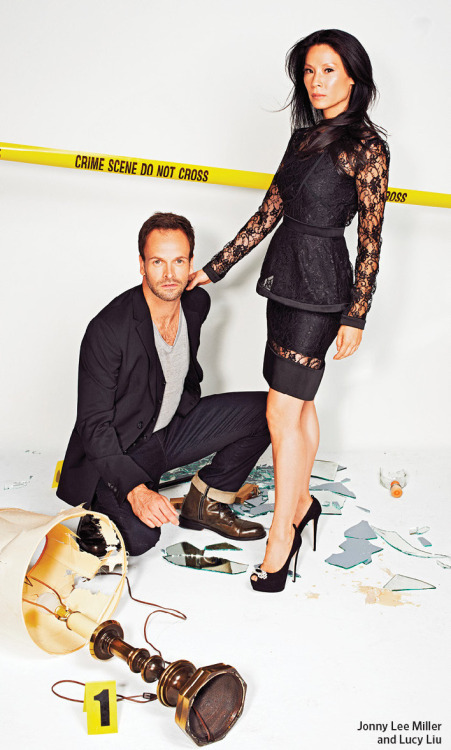
I expect that these efforts to soften or normalise Holmes are partly down to the need to quickly highlight the differences between BBC Sherlock and Elementary. Sherlock is loud, attention-seeking, and refers to himself as a sociopath, whereas Elementary Holmes is more eager to please, openly expresses empathy for complete strangers, and seems relatively functional in everyday society. Something I picked up on right away with Elementary Holmes was that when he said to Watson, "I don't form connections with people," it didn't ring true. Possibly this was intentional -- another indicator that Holmes' Dark Past has led him to avoid relationships? -- but while BBC Sherlock
can't make friends easily because he's so demonstrably an utter dickwaffle, it seems like the only reason why Elementary Holmes is alone is because he's purposefully avoiding personal connections. Which is another reason why I'm hoping that the as-yet-unconfirmed Tragic Backstory is actually a reference to Moriarty (male or female) being the catalyst for Holmes' isolation and addiction, rather than it being a more typical failed relationship story.
It's difficult to tell whether the softer characterisation of Elementary's Holmes will make any difference to the overall popularity of the show. For one thing, Elementary and BBC Sherlock are playing to different audiences, both culturally and in terms of fannish interest groups. I doubt that Elementary is ever going to command the kind of hyper-enthusiastic fervour that BBC Sherlock receives, at least not if it continues on in the vein of "watchable-but-generic episodic crime drama". Plus, Sherlock is far more likely to attract fans of the original Holmes stories because it's a closer adaptation and is full of classic Holmesian trivia. On the other hand, Elementary has considerably more freedom and opportunity to change over the course of a season-long run, and some of those changes will almost certainly be in response to audience reactions.
The main detail in which Elementary is more canon-compliant than BBC Sherlock is the characterisation of Holmes as being
nice. All three recent Holmes adaptations -- BBC Sherlock, the Guy Ritchie movies, and House, MD -- have set Holmes in the "genius asshole" mould, with him being a man so elevated from everyday society that he finds it acceptable to be actively horrible to "normal" people, even his best friend. This type of character is very popular at the moment because people behaving badly and getting away with it can make for very entertaining viewing, but taken to its current extreme it's really not all that similar to canon Sherlock Holmes. A takedown of the "lovable arrogant bastard" cliche is a topic for another day, but I will say that it's refreshing to see Elementary break away from this type of characterisation. It's not a particularly significant scene in the grand scheme of things, but towards the end of the episode when Holmes apologises to Watson through the glass of the holding cell... how
unusual is it to see that type of exchange in a "socially maladjusted genius fights crime" TV show?
I suspect that thanks to Holmes-inspired shows like BBC Sherlock, House, MD and so on, the public perception of Holmes has been skewed slightly from the original characterisation of a man who, while misanthropic and sometimes rude, is ultimately a very caring and moral person. There are a couple of quotes from Lucy Liu to the effect that the Holmes/Watson relationship in Elementary will be a lot more equal than we're used to seeing, and there's already evidence of that in the pilot. Holmes
already listens to Joan's opinion, as well as seeming eager to please and, I think, to let her be in charge. And a lot of this may be a direct effect of Watson being a woman because while "long-suffering sidekick" is funny when it's Martin Freeman or Jude Law, it's less funny when the long-suffering sidekick a woman who is technically being paid to be a caregiver. So in fact, the casting of Watson as a woman had a significant impact on the characterisation of Holmes himself.
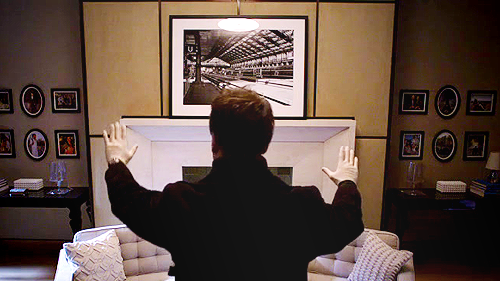 |
| My least favourite deduction. (source) |
So: While the the combination of Watson's no-nonsense steeliness and Holmes' mix of vulnerability and enthusiasm were delightful, the writers are really going to have to up their game when it comes to the crimesolving aspect of the show. In fact, I'm hoping that some better-written crime scenes will be added to the pilot episode when it airs, along with some cleanup regarding the somewhat incoherent Holmes/Watson introduction scene. Aside from that, here are some things I'm hoping to see more of in future episodes:
- BEES. (Almost certainly we will get this. HURRAH.)
- Further (respectful) indications that Holmes is what I saw described somewhere on Tumblr as a "happy sub". By which I mean, no to cheesy handcuff jokes (these stopped being funny in 1975, yet TV writers still seem to love them), and yes to more coherent characterisation of Holmes as a person who likes to have someone to ground him, ie Watson. I strongly suspect that the show is going in this direction already, especially since every single publicity photoshoot has been choreographed to have Lucy Liu in a position of authority while Jonny Lee Miller sits or lies at her feet, which is not the way male/female duos or buddy-cop pairings are usually pictured.
- BETTER DEDUCTIONS. A couple of the deductions made by Holmes in the pilot episode were acceptable, but the rest were things that could have been made by any number of TV detectives, and Holmes needs to stand out. At the moment, it's honestly unclear to me why the police would allow him -- directly out of rehab! -- to be at a crime scene. (Sidenote: Holmesian deductions don't even need to make sense in the real world -- they just need to be showy and impressive. These were neither.)
- Tying into the previous point, I'd love it if the format of each episode's crime storyline could break away from the tried-and-true CSI formula wherein it's very easy for viewers to work out who the killer is, but I don't have high hopes of this because the show is on CBS. I'd be happy enough if they kept the formula but added smarter and more elaborate deduction scenes.
- Some kind of scene where Joan protects Holmes in a physical altercation.

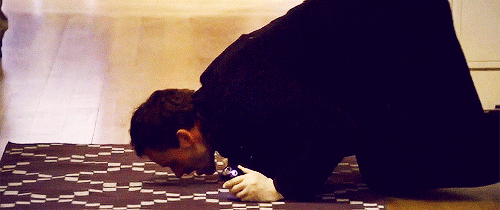

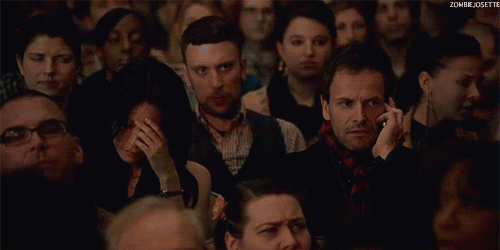
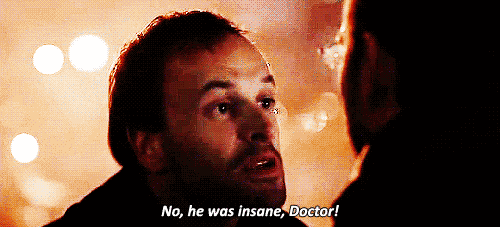
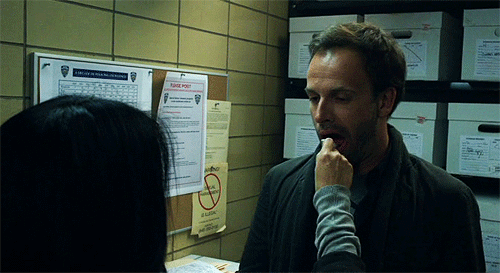
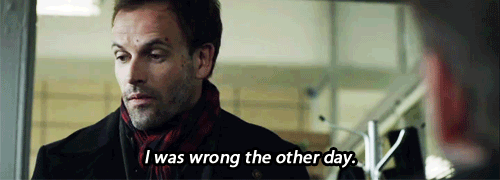


This was as delightful as I'd hoped it be :D I'm hoping that we'll get something wonderful out of this show, even if it won't be something as grand and amazing as Sherlock c:
ReplyDelete"A takedown of the "lovable arrogant bastard" cliche is a topic for another day..."
ReplyDeleteIt's been done: http://lashingsofgb.blogspot.co.uk/2012/01/paging-doctor-sherlock-house.html
Your blog is a daily source of inspiration and motivation. Thank you for your thoughtful, engaging content that always uplifts. Visit this article for extra learning. Geometry Dash Lite Online delivers free, fun gameplay with catchy music. It’s challenging, exciting, and addictive.
ReplyDeletejiiangddu53s
ReplyDeletegolden goose outlet
golden goose outlet
golden goose outlet
supreme outlet
golden goose outlet
golden goose outlet
golden goose outlet
golden goose outlet
golden goose outlet
golden goose outlet